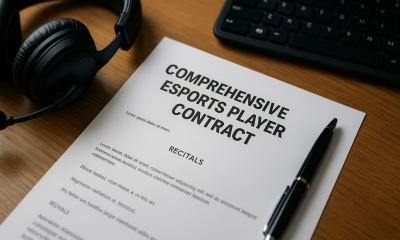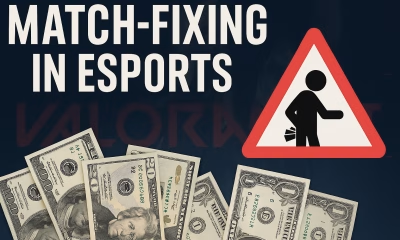Labor&Immigration
Tribunal Judiciaire de Paris: Rethinking the Esports Employment Contract
The Paris Tribunal Judiciaire issued a landmark ruling on 27 March 2024, that has significant implications for the contractual relationships within esports. This decision, which reclassified an esports player’s service contract as an employment contract, marks a pivotal shift in how employment relationships are perceived and regulated in the rapidly growing esports sector. The ruling not only emphasizes the need for a clearer understanding of employment laws in new-age digital and entertainment industries but also potentially sets a precedent for future contractual disputes in esports across jurisdictions.

Table of Contents
Statement of Facts
The case, TJ Paris, ps ctx protection soc. 3, 27 mars 2024, n° 22/02668, involved an esports player who had entered into a contractual agreement with an American esports club to participate in Counter-Strike competitions from 2016 to 2017. The employment contract in question was titled a “self-employed worker contract,” under which the player was ostensibly hired as an independent contractor. This classification has significant legal and financial implications, primarily regarding tax and social security liabilities.
The French URSSAF Caisse Nationale, responsible for the collection of social security and family benefit contributions, challenged the contractual classification. URSSAF initiated a recovery action claiming that the income derived by the player under this contract should be subject to contributions as “non-commercial profits,” according to Article L131-6 of the French Social Security Act. The agency’s position was that the player’s engagement bore all the hallmarks of traditional employment rather than those of an independent contractor.
The player contested URSSAF’s assessment, arguing that despite the contractual designation as a self-employed worker, the actual terms and conditions of his engagement demonstrated a dependency and subordination typical of an employment relationship. This challenge led to judicial scrutiny of the nature of the contractual relationship between the player and the esports club.
Legal Framework and Tribunal’s Analysis of the Employment Contract
The tribunal’s analysis centered on distinguishing between self-employed status and employment based on the degree of subordination to the employer, as characterized by French labor law. Article L.8221-6-1 of the French Labour Code defines independent contractors as follows:
“is presumed to be an independent contractor, any individual whose working conditions are defined exclusively by himself or in a contract, in conjunction with his customer”.
The French Labour Code stipulates that individuals registered as self-employed service providers are generally assumed not to have an employment contract with their clients while carrying out their activities. Nevertheless, this assumption can be challenged. The same legal provision notes that an employment contract may still be recognized if the registered individual delivers services in circumstances that create a continuous subordinate relationship with the client.
The judges meticulously reviewed the contractual obligations and daily activities imposed by the esports club on the player, which included:
- Mandatory participation in specific competitions as directed by the club.
- A set schedule for training and streaming that the player was required to follow.
- Requirements to wear the club’s uniform during official events and partake in promotional activities.
These conditions, alongside regular monthly payments and the provision of accommodations and travel arrangements by the club, clearly illustrated an employer-employee relationship, as the club exerted substantial control over the player’s professional activities.
Analysis of the Tribunal’s Ruling
The judges’ assessment focused on various aspects of the player’s contract and daily work engagements that pointed toward an employment relationship. The following elements were particularly influential in the tribunal’s decision:
- Subordination and Control: The club required the player to participate in specific competitions, adhere to a strict training schedule of 15 hours per week, and engage in a minimum of 20 hours of streaming per month. Such requirements are indicative of an employer’s control over the employee’s work activities.
- Contractual Obligations: The contract stipulated that the player wear the team uniform during competitions and participate in marketing activities dictated by the club. These obligations demonstrate the club’s control over the player’s professional image and public engagements, further evidencing an employment relationship.
- Economic Dependency: The regular payment between EUR 4,000 and EUR 5,000, alongside provisions for accommodation and travel for competitions, indicated an economic dependency typical of an employment relationship rather than freelance or self-employed arrangements.
- Termination Conditions: The contract allowed the club to terminate the agreement if the player failed to meet the set obligations or was unable to provide services for at least 30 consecutive days. This level of control and the potential for penalization align with the characteristics of an employee-employer relationship.
Implications of the Ruling
For Esports Clubs: The reclassification of service contracts to employment contracts suggests that esports clubs need to meticulously review and possibly revise their contractual practices. Clubs may face increased financial liabilities due to obligations to pay social security contributions and potential penalties for previously undeclared work, as outlined in articles L8223-1 and L8211-1 of the French Labour Code. This ruling may compel clubs to establish clearer, more structured employment agreements, potentially increasing operational costs but providing more stability and clarity for both parties involved.
For Players: Esports players may find this ruling beneficial as it provides a clearer path to securing employment benefits, including social security, health insurance, and guaranteed wages. This could also empower players to challenge unfavorable contractual terms and seek reclassification as employees to gain the protections and benefits that employment status confers.
For the Esports Industry: The decision may prompt a broader reevaluation of how esports professionals are classified across the industry. It challenges the current contractual norms and may lead to more standardized employment practices. While this could increase costs for esports organizations, it also has the potential to professionalize the industry further, attracting more stable investments and improving the overall working conditions for players.
Conclusion
The Paris Tribunal Judiciaire’s decision of 27 March 2024 is a very important one for the esports industry. As the sector continues to grow and professionalize, the legal definitions and frameworks that govern these professional relationships will be crucial. Esports organizations and players must take these changes carefully into account, balancing competitive interests with legal compliance and fair labor practices.
Via: Victoire-Avocats


















